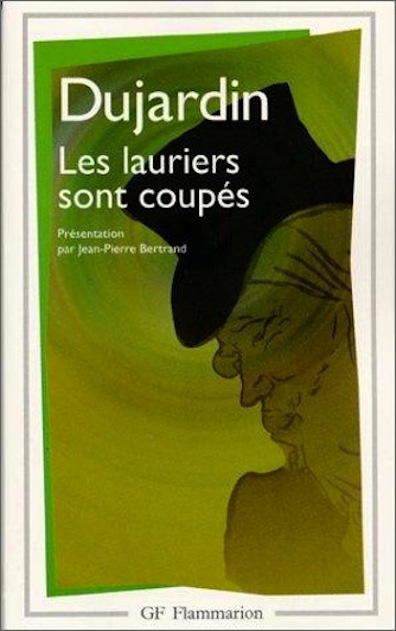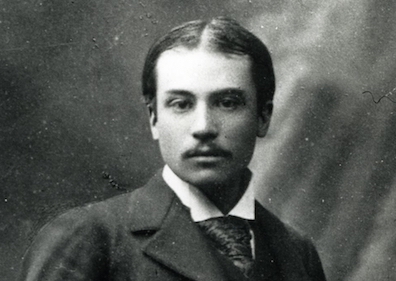The Greek word "Chrysostomos" in the tenth paragraph of Telemachus
compounds chrysos (gold) and stoma
(mouth). Several orators of antiquity acquired this epithet
"golden-mouthed," notably St. John Chrysostomos (ca. 349-407),
a renowned speaker and one of the Three Holy Hierarchs of the
Greek Orthodox faith. The odd one-word sentence appears to
react to Mulligan's "even white teeth glistening here and
there with gold points" in the previous sentence, and by
extension to Mulligan's facility with words. It is the first
appearance in Ulysses of the book's revolutionary
stylistic device of interior monologue, and it
introduces readers to a Stephen who has a lot going on in his
head, not only apart from external reality but in opposition
to it.
Bernard Benstock says of this cryptic one-word sentence, "As
a comment on Buck's dental work it is redundant; as a
narrative comment it is out of place" (Critical Essays,
3). Who is thinking this odd thought? There is only one good
possibility: the person standing next to Buck Mulligan,
watching his moving mouth and listening to his verbal
pyrotechnics. Stephen is the kind of person who can muse on
church fathers before his first cup of tea, and also the kind
of person who would notice that one of Mulligan's middle names
is "St John," linking him with St. John Chrysostomos. And, as
Benstock observes, Stephen repeatedly thinks of Mulligan in
damning one-word judgments: "Usurper"
at the end of Telemachus, "Catamite" in Scylla and
Charybdis, "Chrysostomos" (i.e., glib speaker) here.
Joyce often said that the minor French novelist Édouard
Dujardin inspired him to present the internal, unspoken
thoughts of his characters in this way. Ellmann tells the
story of how Joyce encountered Les lauriers sont coupés
(1888) and was impressed by the technique of Dujardin’s
experimental novel, an extended soliloquy that totally
dispenses with third-person narration (126). He also quotes
several sayings that evoke the book’s appeal to Joyce. One is
a sentence of Fichte that inspired Dujardin: “The I
poses itself and opposes itself to the not-I.” The
other quotes are Dujardin’s: “the life of the mind is a
continual mixing of lyricism and prose,” and the novel must
therefore balance “poetic exaltation and the ordinariness of
any old day.”
“Chrysostomos” shows Joyce following in these Symbolist
footsteps, opposing inward reality to the outward environment.
The word takes readers for one moment into the fanciful realm
of Stephen’s thoughts where ordinary images like gold and
white teeth become imbued with intellectual significance. The
word defines Mulligan––the "not-I"––as a glib coiner of
elegant phrases who does not use language in the service of
truth. It also affords a glimpse of the "I" that is Stephen,
an ego desperately defining itself in opposition to other
human beings. (People who have read Stephen Hero or
especially A Portrait of the Artist as a Young Man are
already familiar with this young man defining reality in his
own way, rejecting all people and institutions who threaten to
warp his understanding of himself.)
The term that Joyce used to describe Dujardin’s
innovation, monologue intérieur, did not originate
with either man. According to Ellmann, Valery Larbaud found
the expression in Paul Bourget’s Cosmopolis (1893)
and gave it to his friend Joyce as a tool for discussing the
author’s big new book (519). Joyce soon felt that the phrase
had outlived its usefulness and went searching for others that
might point readers toward what he was trying to do in the
novel. Nothing better caught on, but his endorsement of
“interior monologue” should at least recommend it over the
comparable phrase “stream of consciousness” that readers often
apply to Ulysses. Only Molly Bloom’s interior
thoughts can justly be called streaming.
[2014] Kevin Birmingham makes this point well in The
Most Dangerous Book: The Battle for James Joyce's Ulysses
(2014). Of the novel's style he writes, “Thoughts don’t flow
like the luxuriant sentences of Henry James. Consciousness is
not a stream. It is a brief assembly of fragments on the
margins of the deep, a rusty boot briefly washed ashore before
the tide reclaims it.”


